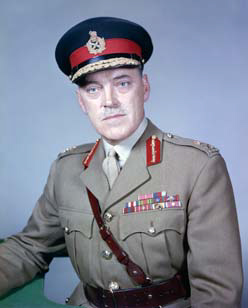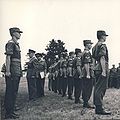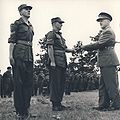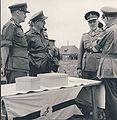Clark, Samuel Findlay
| Samuel Findlay Clark | |
|---|---|
| 17 March 1909 – 1998 | |
 | |
| Nickname | Fin |
| Place of birth | Winnipeg Manitoba |
| Allegiance | Canada |
| Service/branch | Canadian Army |
| Years of service | 1933 – 1961 |
| Rank | Lieutenant General |
| Commands held | Chief of the General Staff |
| Awards | CBE, CD |
Education
Clark received his early education in Winnipeg[2] and attended the University of Manitoba, graduating with a degree in electrical engineering (BSc EE) in 1932.[3] He subsequently attended the University of Saskatchewan to obtain a degree in mechanical engineering (BSc ME) in 1933.[3]
Service
He enrolled in the Canadian Army in 1933, joining the Royal Canadian Corps of Signals as a Lieutenant.[3]
In 1938, he was promoted to Captain and posted to the Royal Military College of Canada (RMC) as an associate professor of electrical and mechanical engineering.[3][4] At the time, Harry Crerar was the RMC Commandant and Guy Simonds was the commander of a cadet company.[3] Leaving the school, he was appointed Adjutant of 1st Canadian Corps Signals.[5][3] He was promoted Major on 1 May 1940 and given command of 2nd Company, 1st Canadian Corps Signals.[6]
He was promoted Lt-Col 20 Feb 1941[7] and appointed Commanding Officer of 5th Canadian Armoured Divisional Signals. In 1942 he served as a General Staff Officer at Canadian Military Headquarters in London.[3] In 1943 he was made Chief Signal Officer at the Headquarters of II Canadian Corps and served in North West Europe.[3] For his service he was made a Commander of the Order of the British Empire[8], was Mentioned in Despatches[9], made a Commander of the Order of Orange Nassau, with Swords (Netherlands)[10] and awarded the United States of America Legion of Merit in the Degree of Officer[11].
In 1945 he became Deputy Chief of the General Staff in Ottawa until 30 November 1947[12] before becoming a member of the Military Committee of the Western European Union and then of NATO.[3] He became Quartermaster-General of the Canadian Army in 1951 and General Officer Commanding Central Command at Oakville, Ontario, in 1955.[3] He was appointed Chief of the General Staff in 1958.[3]
He retired in 1961.
Commander of the Order of the British Empire
His citation for his appointment as a Commander of the Order of the British Empire read:
- During recent operations Brig Clark has distinguished himself by the capable manner in which he has handled all communications problems within 2 Cdn Corps. Although signal resources have many times been under considerable strain, as a result of the rapid advance and the extensive front on which operations were conducted, this officer has never spared himself in his efforts to ensure that communications were maintained a high standard of efficiency. Under the most difficult conditions he has given service far beyond the normal requirements of his duties.
- Since May 43, through all phases of preliminary training, planning for operations and operations the standard of efficiency maintained by the signals units of this Corps is attributable to his outstanding work as CSO.
Commander of the Order of Orange-Nassau, with Swords (Netherlands) Citation
The details supporting his receipt of the subject award read:
- Throughout the campaign in the Netherlands Brig Clark distinguished himself by the outstanding efficiency with which he carried out his duties as CSO of this Corps. His clear appreciation of the many problems involved, his sound planning and his energetic direction of the resources under his control ensured that communications, vital to the successful conduct of the operations in progress, were established and maintained with maximum effectiveness.
Legion of Merit (Degree of Officer) (USA) Citation
The citation for his award, in the Degree of Officer, of the Legion of Merit read:
- During the entire Campaign in NW Europe Brig Clark, as Chief Signals Officer, has directed and controlled the signals resources of this Corps with exceptional ability and effectiveness. Although on many occasions there has been a much greater number of formations under command than the available signals equipments were designed to service, yet by his sound and accurate appreciation and anticipation of the problems involved this officer has so ably planned ahead and allotted all available resources that essential communications were constantly ensured in a minimum of time. Throughout operations Brig Clark has distinguished himself by his exceptionally meritorious conduct in the performance of outstanding services.
Retirement
From 1 October 1968 until 24 March 1973, Clark served as Colonel Commandant of the new Communications and Electronics Branch.[13] He died in 1998.[14]
Related Pages
- No related pages at this time
Related Items
References
- ↑ With material from Wikipedia
- ↑ Who's who in Canada, Volume 58 edited by Charles Whately Parker, Barnet M. Greene
- ↑ 3.00 3.01 3.02 3.03 3.04 3.05 3.06 3.07 3.08 3.09 3.10 Robert Engen, "Army Biography," Canadian Army Journal, Volume 11, No.2, Summer 2008 (pp. 93-95).
- ↑ Canada Gazette Volume 72, number 17, 22 October 1938, page 8.
- ↑ Canada Gazette Volume 73, number 26, 23 December 1939, page 19.
- ↑ Canadian Gazette Volume 74, number 7, 17 August 1940, page 18.
- ↑ Canadian Gazette Volume 74, number 44, 3 May 1941, page 17.
- ↑ The London Gazette, Supplement 37038. 17 April, 1945. Page 2063.
- ↑ The London Gazette, Supplement 37340. 6 November, 1945. Page 5456.
- ↑ The London Gazette, Supplement 37476. 21 February, 1946. Page 1053.
- ↑ The London Gazette, Supplement 37686. 13 August, 1946. Page 4105.
- ↑ Canada Gazette Volume 81, Supplement No.1, 27 December 1947, page 367.
- ↑ 90 Years and Counting (Chapter 6)
- ↑ From a speech given by Dr. R.H. Roy about the Lieutenant-General S. F. Clark, CBE CD Scholarship University of Victoria












